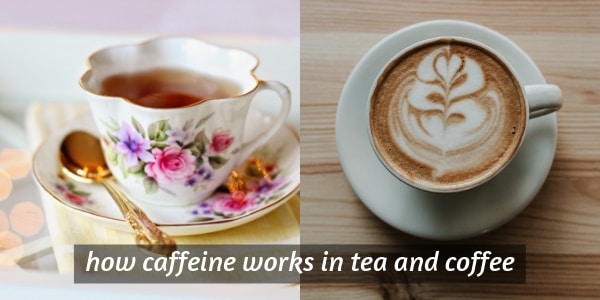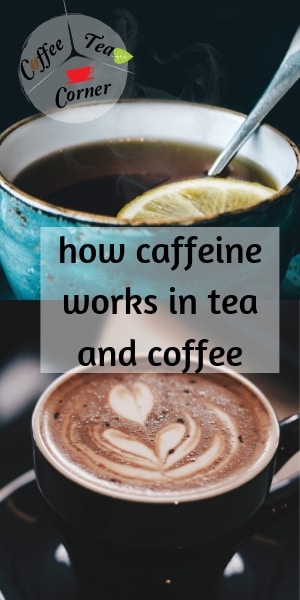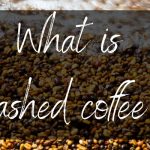The caffeine in tea is often overlooked. This is because it works very differently than the caffeine in coffee, so people are usually surprised when they're told their black tea has caffeine.
But how does caffeine in tea work, if you can't notice it ? Well, with a little training you can, and I'll tell you what to look for. We'll also discuss how the caffeine in coffee works, so you get the full picture.
Table of Contents
A quick word on how caffeine works
We consume caffeinated drinks to stay awake, and we tend to overdo it. We all know that.
But we seem to not know how this stuff works, despite our love for it.
In a very, very short explanation and skipping over some technical matters, caffeine's meant to mimic the chemicals released by the brain when it sleeps.
So, when it's resting. This means that when the brain is starting to feel tired, it will send signals in your body that it needs sleep.
Giving it caffeine will temporarily trick the brain into thinking it doesn't need a nap right now, and it can do its job for a few more hours.
The problem is that we're overexerting ourselves when we do this, if we rely heavily on caffeine to supplement sleep.
No amount of caffeine will match the regeneration done while sleeping, and the rested mind that comes with it.
That being said, the way a cup of coffee wakes you up is very different than a cup of tea. So let's find out.
Caffeine in coffee is a strong kick, can cause jitters
The way coffee works is that it gives you a nice jolt of energy a couple of minutes after ingesting it, and you will almost suddenly feel awake.
Now if you add sugar or cream you're not reducing the caffeine content, you're just diluting the drink and making it longer.
That being said, caffeine will work less effectively if it has to pass through the carbs brought by cream/milk and sugar.
You'll notice the coffee is working if you're starting to get a bit jittery, possibly a bit sweaty, and feel like you have to do everything at once.
This is because the caffeine from coffee passes right into the bloodstream, and has a very powerful direct effect. There is no gentleness, just a direct need to get up and do something.
If you take too much caffeine, you might even get tired after drinking it. This is because your body can only handle so much, and each person had a higher or lower caffeine tolerance.
Your tolerance will increase in time, as you keep consuming caffeine.
You might wonder if the jitters from coffee are normal, or if they're a sign that you've had too much. As far as I could tell, judging by my own experience alone, the jitters aren't a good sign.
They're not a disaster, but rather the sign of a coffee too strong, or too much coffee throughout the day.
After all, the way caffeine in coffee works means that it will be very easy for you to get jittery if you take even a bit too much.
That being said, I've had coffee which only made me feel good and refreshed, no jitters at all.
One last thing, though. This is my own theory, and I have no proof of this other than my own experience.
But I believe that taking caffeine when you're not really needing it - like a mindless cup of espresso on a break at work with the guys, and then another one a couple of hours later - is going to get you extra jittery and uneasy.
At least, that's what I've noticed and I've tried it throughout the years to see if it holds true. For me, it does.
Caffeine in tea is milder, works gently
Why is tea caffeine almost always a surprise ? Well, I think there are several reasons for this.
First, tea has always been viewed as a soothing, simple, comforting drink. It's been associated with curling up with a warm blanket, reading, being quiet, and generally peaceful.
While this is true, tea does contain caffeine, but it works differently.
This is the second reason people are usually surprised tea has caffeine. It doesn't produce a sudden jolt like coffee, it's not the kind of energy that makes you sweaty and extra-alert.
No, tea caffeine is much gentler and works differently.
The caffeine in tea binds with an amino acid called L-theanine.
This bond is what makes tea caffeine act i a slower, more controlled way. Instead of a relatively short, intense burst of energy, you get a prolonged, slow-release form of energy.
This is why you don't even notice the caffeine in tea. It works too subtly for most people to perceive. Especially if you're only used to the way coffee works.
Tea caffeine is much milder, and the fact that it's usually in a lower concentration than coffee caffeine also helps with the general feeling, I guess.
You won't notice a burst of energy, sweaty palms or jitters. But you'll become much calmer, and focused.
It's almost annoying because it's that feeling where you're lacking absolutely nothing. No food, water, sleep, or anything. You're just fine as-is. Which is very hard to cops with, if you're used to getting a snack or taking a nap or drinking something just because.
Mindfulness is what tea caffeine can teach us.
Of course, you can overdo the caffeine in tea as well. But you need about 3 cups of green tea to match a cup of coffee. So, you'd need to be drinking lots of tea.
Young-leaf teas generally have more caffeine
You'll find that young leaf tea is going to be the most caffeinated. This means white tea, while very delicate tasting, will have the most caffeine. It's made entirely out of young leaves, leaf buds, and plant spears.
Then, there would be green teas. These use leaves that have unfurled and have grown a bit, but are not quite mature. They have less caffeine than full, mature leaves and they produce a more bitter/astringent taste.
Green tea, given its taste, is easier to believe has caffeine in it than white tea. Of course, there are ways to make green tea more palatable.
Black tea, which is made from leaves older than the green tea, is going to have less caffeine.
Add to this the fact that some teas which are not white will sometimes use leaf buds or spears, and your caffeine level will change.
So you could easily end up with a black tea that contains some leaf spears, that has the same amount of caffeine as a green tea.
(If you like this article so far, you can pin it to your Pinterest board by clicking the image below. The article continues after the image.)
Caffeine content in tea and coffee is very similar
Now let's start with the actual caffeine content. We won't get very technical, but let's agree that both coffee and tea can have very different varieties, both in taste and strength.
So comparing 'tea' and 'coffee' as two wholes is not going to work.
Coffee is usually one of two bean types, and sometimes a blend of the two. There is the Robusta, which is the darker, stronger, bitter, way more caffeinated sister. It can sometimes taste actually good.
It's found in instant coffee, it's used as filler coffee, and adds a whole lot of depth and oomph to a cup of coffee. A cup of just Robusta coffee is very harsh, though.
Arabica is the lighter, fruitier or floral, rather delicate one. It's the kind of coffee you'll find most often on supermarket shelves. Sometimes you'll notice blends of Arabica and Robusta, and I'll tell you why that is.
Arabica is much lighter and weaker than Robusta. It's got a lighter, watery body (compared to Robusta) and it's got about half the caffeine content of Robusta.
So blending the two in different percentages will yield a rounded, all-encompassing cup of coffee.
You can check the Arabica to Robusta ratio of your coffee on the package, if it's a blend. You might notice that you've got an Arabica blend.
That means your coffee has Arabica beans from different estates or countries.
Put simply, the more Robusta you have in your brew, the larger the caffeine content.
As for tea, this can vary from tea type to tea type. Not all green teas have the same caffeine content, and the way the leaf was processed does not affect this.
So a black tea will not automatically have more caffeine than a green tea, because the leaves were processed more.
However a white tea will have more caffeine than all, and a green tea has chances of having more caffeine than black tea.
This is because the younger the leaf used for tea, the more caffeine content in it. This means that white tea, which uses very young leaf buds will have the highest caffeine content.
But there are black teas that also use a few leaf buds mixed into the older leaves usually used.
So there, now we're all confused. The only two things that's certain are:
- the caffeine content of tea and coffee can vary wildly, according to what kind of coffee bean or tea leaf was used
- we can only work with very large intervals, like coffee caffeine usually being somewhere between 96-165 mg for 8 oz of brew, while tea caffeine is usually 25-50 for 8 oz of brew.
Caffeine extraction depends on steeping time for coffee and tea
Another element that makes everything more complicated to compute, is the brewing time of the drink.
For example, brewing a green tea for 2 minutes will get most of its caffeine out. But brewing it for 30 seconds won't get you as much caffeine, even if you used the same water temperature or number of leaves.
Also, while white tea does contain more caffeine that black tea, you can't steep it as long. Which means you end up with less caffeine, otherwise the tea would be ruined.
You can even push it to some 3 minutes in some rare cases, though I recommend you taste it every half minute and see where you're at.
Similarly, oversteeping a tea to try and get all the caffeine out will only result in bitter tea, and for green tea it will muddle the color as well.
for this reason, black tea seems to be the highest in caffeine, simply because it can withstand longer brewing time.
When brewing coffee, the brewing time matters as well.
This is why an espresso, while very strong in taste, will have less caffeine than a filter or French press coffee.
Remember the numbers I quoted earlier for caffeine in coffee ? Those were for brewed filter or French press coffee.
This is because the water needs to be in contact with the coffee (or tea leaves) for several minutes, in order to extract the caffeine properly, and get all of it out.
And here is where the espresso fails to deliver all the caffeine. A usual shot of espresso is a 1 oz/30 ml shot, in which hot water passes for 25-30 seconds through the coffee grounds.
That's not very much time for all the caffeine to be released into your cup. But it produces a beautiful crema and a strong-tasting drink.
Still, a cup of old fashioned filter coffee will have almost double the caffeine of an espresso. And it has nothing to do with the amount of water used, but simply with how much the water has been in contact with the coffee grounds.
The same way, a French press coffee will give you a much stronger coffee (caffeine-wise) than a Moka (otherwise known as percolator). This is because the French press keeps the coffee grounds submerged for longer than the Moka pot.
So when you're comparing the caffeine content in coffee and in tea, you will pretty much need to take a look at the brewing method as well.
Final thoughts
Figuring out why you don't feel your tea kicking in as much as a cup of coffee is pretty revealing. First, we find out they work differently, and then we find out the amount in both is very similar.
Still, you'd need to drink a lot of tea to match coffee, so I think overdoing it with tea can be a little hard.
If you want to know more about coffee or tea, feel free to check the related articles below. Who knows what else you might find ?






